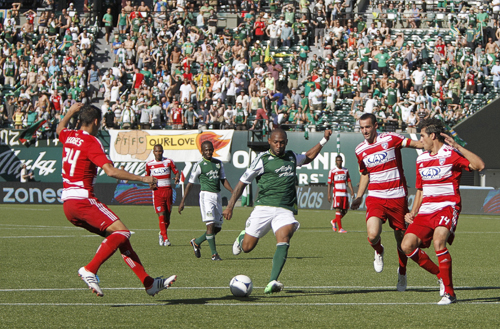We are less than a week away from another exciting Portland Timbers season, and you know what that means! You do, right? Because, actually, I have no idea. I have no concept whatsoever of what soccer, professional or otherwise, means in the United States. Beyond the fact that it means more, I don’t have any idea what soccer means outside of the country, for that matter. The idea of soccer in general, but especially in America, is totally opaque to me. Given the rabid mythologizing of sports in our culture, I think this is very strange.
Portland soccer

We are less than a week away from another exciting Portland Timbers season, and you know what that means!
You do, right? Because, actually, I have no idea.
I have no concept whatsoever of what soccer, professional or otherwise, means in the United States. Beyond the fact that it means more, I don’t have any idea what soccer means outside of the country, for that matter. The idea of soccer in general, but especially in America, is totally opaque to me. Given the rabid mythologizing of sports in our culture, I think this is very strange.
So bear with me while I try to have an opinion about soccer.
Soccer has been “gaining popularity” in the United States ever since I played in fourth grade. There has always been this apocryphal notion that it was the most widely played sport among American children, an inexorable force that would eventually sweep the nation. I get the sense that this was wildly overstated, but I’m not really sure why it was said at all.
After all, there has never been an assault on soccer. I think that, for a very long time, Americans found the game boring to watch and play, and initially soccer didn’t pretend to be exciting in ways that it clearly wasn’t. We were never made to feel dumb for not participating in the sport, so we had no beef with it. I remember moving while in elementary school from the city, where we played only basketball and football, to the suburbs, where all the popular kids played soccer. It blew my mind and made me feel a bit more out of place than the typical new kid, but I didn’t really care.
And I think that it is this indifference that really sticks in the craw of soccer people. In many parts of the world, particularly in some of the most impoverished, soccer is a national obsession because it is so cheap to play. No equipment is needed beyond a ball, and goals can be fashioned from nearly anything and with minimal work. Simply put, soccer is something that everyone can own. But in our country, participation in soccer seems to have evolved in exactly the opposite way. Here, it’s a game played in the suburbs on well-manicured fields by primarily middle-class kids—SUVs and attractive mothers and juice boxes.
My theory is that this strand of American culture just doesn’t like the idea that a part of its identity doesn’t matter—hence the persistent promise that soccer was the next big thing when it really wasn’t, that it really did matter in ways that it very obviously didn’t. It always felt to me as if people involved in this American version of the
global game were defending themselves in the face of some kind of imagined outside vitriol threatening their pastime.
But we don’t hate soccer. Never have. We just don’t care, and in a country that loves sports to a probably unhealthy degree, it is this lack of interest that stings the most.
It also may help to explain why Portland has so wholeheartedly embraced the Timbers. Our local obsession with a deeply ironic lifestyle makes Major League Soccer a perfect match. Oh, no one else in the country cares one way or another about soccer? Then Portland will have the very best fans in all of MLS! Soccer is the fixed-gear bike of sports: Everyone is fine with it, but there are definitely better options, so loving it makes you stand out a bit. The Timbers are as much about their fans as they are about soccer, especially since the team stinks at soccer. Portlanders enjoy that kind of attention.
Almost exactly a year ago, I attended the opening game of the Timbers’ 2012 season. I was in the Timbers Army section, scarf in hand, chanting, imbibing, singing, dancing drone-bee style whenever I was supposed to, and the Timbers got the win (a minor miracle last season). I couldn’t help but notice that, live, the game was not appreciably more exciting to watch than it was on TV. I thought that was a bad sign for the game, but, you know, I had a good time. I wish the Timbers well this season, and if I have a chance to go to a game or two, I probably will.
That’s how far along I am in my evolution as a soccer fan. I think that’s about as far as we’ve come in our national appreciation of the game, too—still generally unconcerned, but we wish it all the best.







